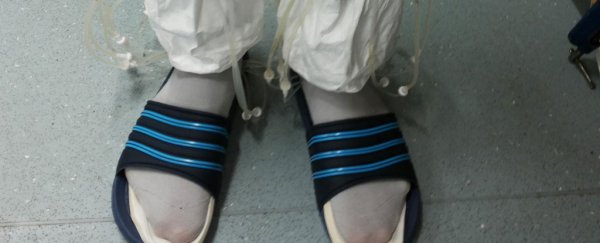With 195 countries having just signed up to lower their carbon emissions so we can keep global warming under 2 degrees Celsius this century, the world is going to need new power sources. Unconventional ones. Even unmentionable ones.
Thankfully, researchers in the UK have been working on just such a thing, with a unique urine-based system that operates on the power of pee. They've developed a pair of socks embedded with microbial fuel cells (MFCs) and fuelled with urine pumped by the wearer's footsteps.
The device, which is the first self-sufficient MFC system powered by a wearable energy generator, offers a way to convert natural human waste into a practical power source – one which is capable of powering a wireless transmitter to send a signal to a PC.
"Having already powered a mobile phone with MFCs using urine as fuel, we wanted to see if we could replicate this success in wearable technology," said Ioannis Ieropoulos from the University of the West of England (UWE Bristol). "We also wanted the system to be entirely self-sufficient, running only on human power – using urine as fuel and the action of the foot as the pump."
Unlike MFC device designs that involve mains power, here the use of a pump to circulate the urine over microbial fuel cells relies solely on human activity. Soft tubes placed under the heels in the footwear ensure that the urine is pumped during walking, generating energy as it passes over the MFCs. In testing, the getup was able to send a message every 2 minutes to a PC-controlled receiver module.
The findings, reported in Bioinspiration & Biomimetics, are more than just the latest in wearable technology. Provided you're happy to sport socks filled with your own urine – which we imagine may prove a bit of a challenge for the marketing department – such a system could very well save your life in an emergency when no other power sources are around.
"This work opens up possibilities of using waste for powering portable and wearable electronics," said Ieropoulos. "For example, recent research shows it should be possible to develop a system based on wearable MFC technology to transmit a person's coordinates in an emergency situation. At the same time this would indicate proof of life since the device will only work if the operator's urine fuels the MFCs."
While we're not sure if the technology in its current incarnation is something that campers and hikers would ever readily toss in to their backpacks for a weekend away, the research is the latest proof of concept showing how waste – whether animal-derived or otherwise – is a potent, tappable energy source we really shouldn't squander.
